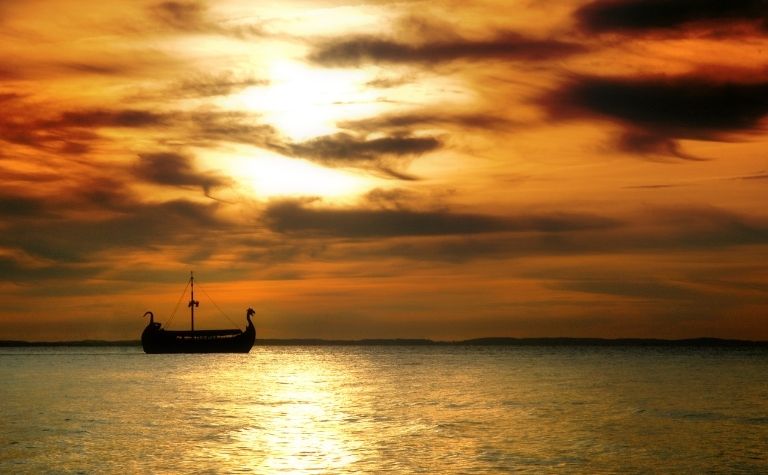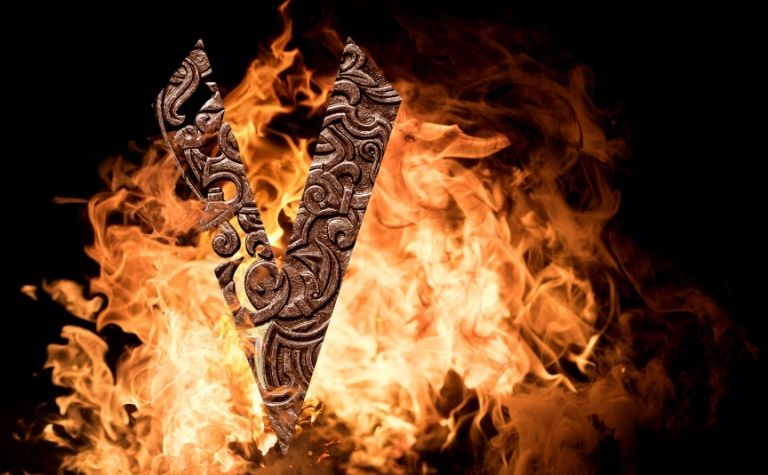There’s been a renewed interest in early Viking culture in the past decade or so.
With shows like the History Channel’s Vikings and Netflix’s Vikings Valhalla and games like Assassin’s Creed: Valhalla, it’s not hard to see why that is.
But what do the people of Scandinavia actually think about their Viking heritage and past?
For the most part, Scandinavians are very proud of their Viking roots, and many have embraced their Viking heritage.
There’s been a resurgence of the Vikings’ belief system, known today as Asatru, and more and more people are joining Viking groups and adopting parts of Viking culture.
As is true with any large group of people, there will always be exceptions to the rule. In Scandinavia and other parts of the world, some people dislike the Vikings and think they were horrible people. [1]
However, Scandinavia as a whole seems to appreciate its Viking history, and that larger group of Scandinavians will be the focus of this article.
Also see Did the Vikings Wear Armor? to learn more.

Do Scandinavians Consider Themselves Vikings?
Most Scandinavians don’t consider themselves Vikings, though they appreciate their Viking heritage.
It’s the same way that many Americans no longer consider themselves Irish or Scottish, but they are still proud of their Irish or Scottish roots.
It’s interesting to note that Scandinavians never even called themselves Vikings. [2]
In an opinion piece titled “Are We Vikings or Scandinavians,” for the Norwegian American, Dr. Elisabeth I.
Ward discusses the term “Viking” and how various people use it to mean very different things. [3]
In recent years, some people have co-opted the word “Viking” and applied it to a particular group of people.
To these people, “Viking” is synonymous with “Aryan,” as in Hitler’s “Aryan race.” However, for many others, that’s not what being a Viking is at all.
Unfortunately, Dr. Ward insists that some people are now using the term “Scandinavian” to mean something similar.
That’s because the outside world often sees Scandinavians and Vikings as being the same thing – they aren’t – and that “same thing” regrettably has racist connotations.
Today, many Scandinavians reclaim portions of their Viking heritage and culture and try to make people see that being a “Viking” isn’t evil or hateful. That is Dr. Ward’s goal, as well.
In her words, she feels “a similar sort of urgency about managing the reputation of Scandinavians.”
To this end, Scandinavians are taking more interest in their museums and cultural exhibits.
They’re setting up villages that show people what a day in the life of a Viking was like, and even reclaiming the old Norse beliefs. [4]
Also see Is the Minnesota Vikings Helmet Thor? to learn more.

Are Scandinavians Proud of Vikings?
Most Scandinavians are proud of their Viking heritage, though they realize that Vikings didn’t always do good things.
Like any descendants of a conquering nation, they have pride in their people but recognize their problematic and sometimes dark history.
Today, someone from the United States may be “proud to be an American,” just as the song says.
However, that same person understands that Americans destroyed many Native Americans’ lives during the founding of the US. Slavery is another awful, dark stain in America’s history.
Most United States citizens aren’t proud of either of those things, but they still have pride in their nation and country.
Scandinavians recognize that Vikings did some terrible things in their time. They massacred Christians and non-violent people of faith. (The raid at Lindisfarne is one notable example of the Vikings’ cruelty. [5])
However, as Dr. Ward discusses briefly in her article, the Vikings were more than just raiders and killers.
They were farmers, traders, craftsmen, and seafarers. They were, as Ward puts it, “real, complex human beings. Not stereotypes.”
Some of the things the Vikings did were wonderful and way ahead of their time.
For example, Vikings were one of the few people of that period to treat women with respect.
Viking women did indeed cook, clean, and care for children. However, they also had a surprising amount of rights, including:
- The right to own property
- The ability to select their husbands (though their families played a role, as well)
- The ability to divorce their husbands
- The right to reclaim their dowries after a divorce
- The right (and duty) to manage their households and their husbands, to a certain extent
- The right to rule (in specific, rare instances) [6]
There were even female Viking warriors, though probably not as many as pop culture makes it seem there were.
The Vikings also had an admirable set of laws that were much fairer than other societies’ laws at the time.
Furthermore, while not as impressive as the Celts, their respect for nature was admirable.
In other words, modern Scandinavians have a lot to be proud of concerning their Viking heritage, even if it wasn’t all good.
Also see Did the Vikings Fight the Mongols? to learn more.

What Do Scandinavians Think of Vikings TV Series?
There’s never a single answer to what people think about television shows, movies, and other forms of entertainment. People are diverse and have their likes and dislikes.
It’s what makes the world great. It’s also why there’s not a definitive answer to whether or not Scandinavians like the Vikings TV series.
Some Scandinavians enjoy the History Channel’s show, Vikings, while others don’t.
However, whether or not they like it, most agree that it’s largely fictionalized – more “Viking fantasy” than “Viking history.”
They probably appreciate what it’s done for their tourism dollars, though.
Many of the characters in the show are based on real people – or at least real Viking legends.
However, the circumstances in which they find themselves are often adapted for entertainment purposes or entirely fictionalized.
For that reason, Scandinavians don’t think of the show as an accurate representation of their history.
The following table will point out some of the most significant differences between history and how Vikings portrayed that event or person. [7]
| Event/Person | What Happened in Vikings | What Actually Happened |
| Ragnar’s Scheme to Get Into Paris | Ragnar faked his death, and the Vikings brought him into Paris in a coffin with weapons. He jumped out, captured the princess, and forced the emperor to surrender. | Something similar to this actually happened in history. However, Bjorn Ironsides was the Viking who used the tactic to get into a city in Italy. |
| King Alfred | Alfred is the illegitimate son of Judith and Athelstan. | King Alfred was the legitimate son of King Æthelwulf and his wife (not named Judith). |
| Rollo and Ragnar | They were brothers. | There was no relation between Rollo and Ragnar. They likely weren’t even alive simultaneously, if Ragnar even existed. |
| Ragnar | Until the last couple of seasons, Ragnar was the center of the show; everything revolved around him. | Scholars can’t confirm if Ragnar was a real person. He might have been, but he may have also been a legendary hero. |
| Harald Finehair and Halfdan | They were brothers. | Halfdan was King Harald’s father, not his brother. |
Conclusion
Most Scandinavians don’t consider themselves Vikings. However, they are proud of their Viking heritage, and many have reclaimed aspects of Viking culture.
Also see Did the Vikings Travel to Asia? to learn more.
References:
[1] Source
[2] Source
[3] Source
[4] Source
[5] Source
[6] Source
[7] Source
